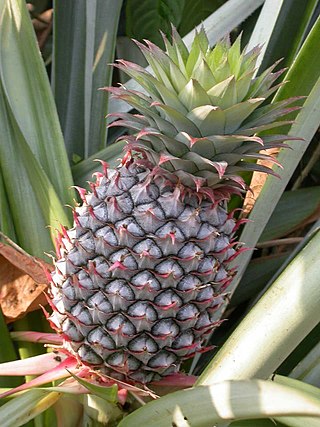
The Bromeliaceae are a family of monocot flowering plants of about 80 genera and 3700 known species, native mainly to the tropical Americas, with several species found in the American subtropics and one in tropical west Africa, Pitcairnia feliciana.
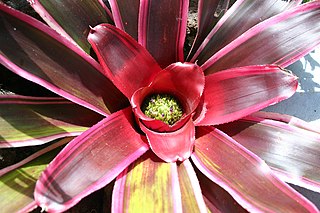
Neoregelia is a genus of epiphytic flowering plants in the family Bromeliaceae, subfamily Bromelioideae, native to South American rainforests. The genus name is for Eduard August von Regel, Director of St. Petersburg Botanic Gardens in Russia (1875–1892).

Vriesea is a genus of flowering plants in the botanical family Bromeliaceae, subfamily Tillandsioideae. The genus name is for Willem Hendrik de Vriese, Dutch botanist, physician (1806–1862). Its species are widespread over Mexico, Central America, South America and the West Indies.
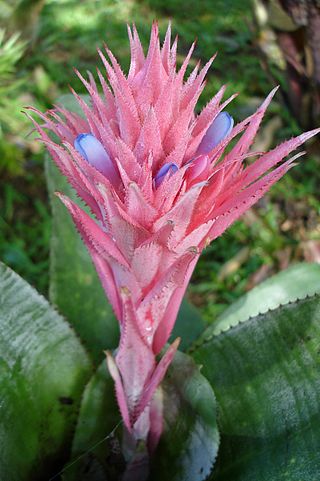
Aechmea is a genus of flowering plants in the family Bromeliaceae. The name comes from the Greek aichme, meaning "spear". Suggested pronunciations include EEK-me-ə and eek-MEE-ə. Aechmea comprises eight subgenera and around 250 species distributed from Mexico through South America and the Caribbean. Most of the species in this genus are epiphytes.

Cryptanthus is a genus of flowering plants in the family Bromeliaceae, subfamily Bromelioideae. The genus name is from the Greek cryptos (hidden) and anthos (flower). The genus formerly had two recognized subgenera: the type subgenus and subgenus HoplocryptanthusMez which has been raised to the separate genus Hoplocryptanthus. All species of this genus are endemic to Brazil. The common name for any Cryptanthus is "Earth star".

Wittmackia is a genus of flowering plants in the family Bromeliaceae.

Pitcairnia is a genus of plants in the family Bromeliaceae, subfamily Pitcairnioideae. It was named for William Pitcairn, Scottish physician and gardener (1711–1791). The genus Pitcairnia ranks as the second most prolific of the bromeliad family. They are most abundant in Colombia, Peru and Brazil, but can also be found in areas from Cuba and Mexico south to Argentina. One species, Pitcairnia feliciana, is found in tropical West Africa and is the only member of the family Bromeliaceae not native to the Americas.

Orthophytum is a genus in the plant family Bromeliaceae, subfamily Bromelioideae.

Hohenbergia is a genus of plants in the family Bromeliaceae, subfamily Bromelioideae. It is native to the West Indies, the Yucatán Peninsula, and northern South America.

Nidularium is a genus in the plant family Bromeliaceae, subfamily Bromelioideae. Named to describe the nestling characteristic of the inflorescence, all the species are endemic to Brazil. Commonly confused with Neoregelia which they resemble, this plant group was first described in 1854.

Ronnbergia is a genus in the plant family Bromeliaceae, subfamily Bromelioideae. Native to South and Central America, this genus was named for Auguste Ronnberg, Belgian Director of Agriculture and Horticulture in 1874.
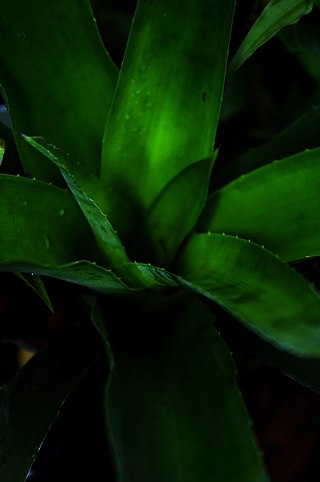
Chevaliera is a subgenus of the genus Aechmea.
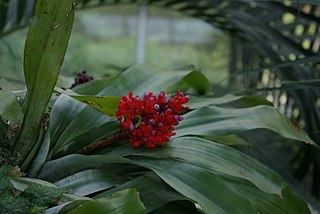
Lamprococcus is a subgenus of the genus Aechmea.

Tillandsia subg. Anoplophytum is a subgenus of the genus Tillandsia.
Billbergiopsis is a subgenus of the genus Quesnelia and contains 14 of the 20 or more described species of the genus.
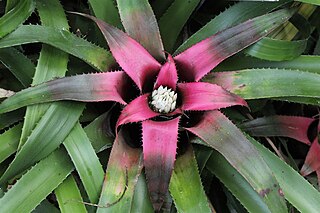
Hylaeaicum is a genus of flowering plant in the family Bromeliaceae, native to tropical northern South America. The taxon was first described by Ernst Heinrich Georg Ule in 1935 as a subgenus of "Aregelia". It was later treated as a subgenus of Neoregelia, before being raised to a full genus in 2021, a status accepted by both Plants of the World Online and the Encyclopaedia of Bromeliads.

Tillandsia subg. Tillandsia is a subgenus of the genus Tillandsia.

Tillandsia subg. Aerobia is a subgenus of the genus Tillandsia.

Neoregelia subg. Longipetalopsis is a subgenus of the genus Neoregelia.


















